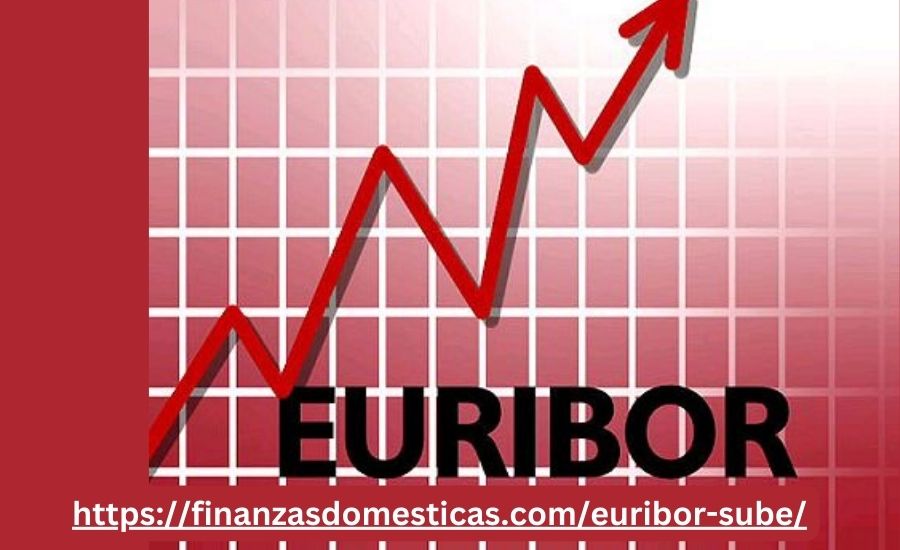The Euribor rate is climbing again, and it’s catching everyone’s attention! The latest update from [https://finanzasdomesticas.com/euribor-sube/] shows a surprising increase that could impact many homeowners and borrowers. If you have a variable-rate mortgage, this news might mean higher payments are on the way.
At [https://finanzasdomesticas.com/euribor-sube/], we’re here to help you understand what this change means for you. Whether you’re saving or borrowing, knowing how these rates affect your money is super important. Let’s dive into what’s happening and how you can stay ahead!
What’s Behind the Rise? [https://finanzasdomesticas.com/euribor-sube/] Explained
The recent rise in the Euribor rate has caught the attention of many, and understanding the reasons behind this increase is essential. One of the main drivers of this upward trend is inflation. When inflation rates increase, central banks, including the European Central Bank (ECB), often respond by raising interest rates to curb spending and control the money supply. This reactionary measure aims to reduce inflation but also results in higher borrowing costs for consumers and businesses alike. Therefore, the Euribor, which reflects these borrowing costs, naturally rises in tandem with inflation.
Another significant factor contributing to the rise in the Euribor is the ECB’s monetary policies. The ECB plays a crucial role in managing the economic stability of the Eurozone by adjusting its policy rates. When the ECB anticipates economic growth or inflation, it may decide to tighten its monetary policy by raising interest rates. This, in turn, pushes the Euribor higher as banks adjust their lending rates based on these policy changes. These adjustments are crucial for maintaining a balance in the economy, but they also directly impact the Euribor rate.
In addition to inflation and ECB policies, global economic conditions also influence the Euribor. For instance, economic uncertainty or geopolitical tensions can lead to tighter financial conditions, prompting banks to increase their lending rates. As a result, the Euribor rises as a reflection of these broader economic concerns. Understanding the factors behind the rise in [https://finanzasdomesticas.com/euribor-sube/] is essential for anyone looking to manage their finances effectively during these times of economic change.
How [https://finanzasdomesticas.com/euribor-sube/] Affects Your Mortgage Payments
For many homeowners, the rise in the Euribor is more than just a number; it directly impacts their monthly mortgage payments. If you have a variable-rate mortgage, your payments are likely tied to the Euribor, meaning that as the Euribor increases, so do your monthly costs. This can be particularly challenging for families on a tight budget, as even a small increase in the Euribor can lead to significant changes in the amount you need to pay each month. This connection between the Euribor and mortgage payments makes it crucial to monitor rate changes closely.
When the Euribor rises, banks adjust the interest rates on existing variable-rate mortgages, leading to higher monthly payments. For instance, a slight increase in the Euribor could result in an additional €50 to €100 per month for the average mortgage, depending on the loan amount and the term. This increase may not seem substantial at first glance, but over a year, it can add up to a considerable amount, putting extra strain on household finances. Therefore, it’s important to be aware of how changes in [https://finanzasdomesticas.com/euribor-sube/] can impact your mortgage costs.
To mitigate the impact of rising Euribor rates, some homeowners consider refinancing their mortgages to a fixed-rate option. A fixed-rate mortgage locks in the interest rate for the duration of the loan, providing stability in monthly payments even if the Euribor continues to rise. While refinancing comes with its own set of costs and considerations, it can be a valuable strategy for those looking to avoid the unpredictability of variable-rate loans. Understanding these options and how [https://finanzasdomesticas.com/euribor-sube/] affects your mortgage can help you make informed decisions to protect your financial well-being.
Smart Tips to Handle the Euribor Increase on [https://finanzasdomesticas.com/euribor-sube/]

Handling the rise in the Euribor doesn’t have to be overwhelming if you know the right strategies. One of the most effective ways to manage higher interest rates is by paying down your mortgage principal faster. By making additional payments towards your principal, you can reduce the overall amount of interest you’ll pay over the life of the loan. This strategy is especially beneficial when interest rates are rising, as it helps you minimize the impact of future rate hikes on your monthly payments. In the long run, even small extra payments can make a big difference.
Another smart approach to handling the Euribor increase is to review and adjust your household budget. Start by identifying non-essential expenses that you can cut back on to free up more money for your mortgage payments. For instance, dining out less frequently or reducing discretionary spending can help you save more each month. This extra savings can then be used to cushion the impact of higher mortgage costs. Additionally, creating a detailed budget that tracks your income and expenses will give you better control over your finances, making it easier to navigate periods of rising rates.
If you’re concerned about the long-term effects of rising Euribor rates, consider discussing refinancing options with your lender. Refinancing to a fixed-rate mortgage can provide stability by locking in a consistent interest rate, protecting you from future increases. However, it’s important to carefully weigh the costs of refinancing against the potential savings. By staying proactive and implementing these strategies, you can better manage the challenges posed by the rise in [https://finanzasdomesticas.com/euribor-sube/], ensuring that your financial situation remains stable even as interest rates fluctuate.
Will [https://finanzasdomesticas.com/euribor-sube/] Continue to Rise? Expert Insights
The future of the Euribor is a topic of much speculation among financial experts. Many believe that the Euribor may continue to rise in the short term due to ongoing economic factors such as inflation and the European Central Bank’s (ECB) monetary policy decisions. Inflationary pressures, driven by factors like rising energy costs and supply chain disruptions, are expected to persist, leading the ECB to maintain a tighter monetary policy. As a result, the Euribor, which is closely tied to these policies, may experience further increases in the coming months.
However, some experts suggest that there may be a stabilization or even a slight decline in the Euribor if economic conditions improve. For example, if inflation begins to ease and the ECB feels confident that price stability is within reach, it might relax its monetary policies, leading to a decrease in interest rates. This scenario could result in a leveling off of the Euribor. While this outcome is less certain, it highlights the importance of staying informed about economic trends and central bank decisions, as these factors directly influence the direction of the Euribor.
Ultimately, the future of the Euribor is uncertain, and it’s difficult to predict with absolute certainty whether it will continue to rise or stabilize. However, by staying updated with expert insights and regularly checking sources like [https://finanzasdomesticas.com/euribor-sube/], you can be better prepared to adapt to any changes. Whether the Euribor rises or stabilizes, having a plan in place for your financial future will help you manage the impact on your personal finances effectively.
The Impact of [https://finanzasdomesticas.com/euribor-sube/] on Your Savings Account
A rise in the Euribor doesn’t just affect borrowers; it also has implications for savers. When the Euribor increases, banks may offer higher interest rates on savings accounts to attract deposits. This means that savers could see better returns on their money, making it a good time to review and possibly switch to a savings account with a higher interest rate. This is especially beneficial if you have substantial savings, as even a small increase in interest rates can lead to more significant earnings over time.
However, it’s important to remember that while higher interest rates on savings accounts are a positive outcome, they may not always keep pace with inflation. If inflation is rising faster than the interest rates offered by banks, the real value of your savings could decrease over time. This means that your money might not go as far in the future as it does today, even if you’re earning more interest. Therefore, it’s crucial to consider both the nominal interest rate and the rate of inflation when assessing the impact of [https://finanzasdomesticas.com/euribor-sube/] on your savings.
For those looking to maximize their savings, diversifying your investment portfolio could be a smart move. While savings accounts are a safe option, exploring other investments that offer higher returns, such as bonds or mutual funds, can help you stay ahead of inflation. It’s important to assess your risk tolerance and financial goals before making any investment decisions. By understanding the impact of [https://finanzasdomesticas.com/euribor-sube/] on your savings and exploring all your options, you can ensure that your money continues to work for you, even in a rising interest rate environment.
Understanding the Latest [https://finanzasdomesticas.com/euribor-sube/] Changes
Understanding the latest changes in the Euribor is crucial for anyone managing loans, mortgages, or savings. The Euribor rate is influenced by several key factors, including economic conditions, inflation, and the European Central Bank’s monetary policy. Recently, the rate has been rising due to higher inflation and the ECB’s efforts to control it by tightening monetary policy. This means that borrowing costs have increased, which can impact everything from mortgage payments to the cost of personal loans.
It’s also important to note that the Euribor is calculated daily, based on the average interest rates at which European banks lend to each other. Because of this, the Euribor is highly sensitive to changes in the financial markets. For instance, any news that impacts the economy, such as political events or shifts in global trade, can cause fluctuations in the Euribor. Keeping up with these changes is essential, as they can have a direct impact on your financial obligations. Understanding how [https://finanzasdomesticas.com/euribor-sube/] changes can help you make better financial decisions.
Staying informed about the latest Euribor changes is not just about managing current loans but also about planning for the future. Whether you’re considering taking out a new loan, refinancing an existing mortgage, or adjusting your investment strategy, knowing where the Euribor is headed can provide valuable insights. By regularly checking updates from reliable sources like [https://finanzasdomesticas.com/euribor-sube/], you can stay ahead of the curve and ensure that your financial decisions align with the current economic landscape.
How to Protect Your Finances from [https://finanzasdomesticas.com/euribor-sube/] Increases

Protecting your finances from the impact of rising Euribor rates requires proactive planning and smart financial strategies. One effective way to shield yourself from higher borrowing costs is by considering a fixed-rate mortgage. Unlike variable-rate mortgages, which fluctuate with the Euribor, a fixed-rate mortgage locks in your interest rate for the entire term of the loan. This provides stability and predictability in your monthly payments, making it easier to budget and plan for the future.
Building an emergency fund is also an important strategy. An emergency fund acts as a financial safety net, providing you with a cushion in case of unexpected expenses or income loss. With rising Euribor rates potentially increasing your monthly payments, having extra savings set aside can help you cover these additional costs without disrupting your budget. Financial experts typically recommend saving at least three to six months’ worth of living expenses in your emergency fund to ensure you’re adequately prepared.
Lastly, regularly reviewing and adjusting your budget can help you stay on top of your finances during periods of rising interest rates. Identify areas where you can reduce your expenses and income by tracking them. For example, you might reduce discretionary spending or renegotiate bills and subscriptions to lower your monthly costs. By staying disciplined with your budget and making adjustments as needed, you can better manage the impact of [https://finanzasdomesticas.com/euribor-sube/] on your finances, ensuring that you remain financially secure even as rates continue torise.
Why [https://finanzasdomesticas.com/euribor-sube/] is Making Headlines Now
The Euribor is making headlines now because of its recent and unexpected rise, which has significant implications for both borrowers and savers. After a period of relative stability, the Euribor has started to climb again, driven by economic factors such as rising inflation and changes in the European Central Bank’s monetary policy. This increase is particularly newsworthy because it directly affects the cost of borrowing, especially for those with variable-rate mortgages. As a result, many people are concerned about how these changes will impact their finances.
One reason the Euribor is gaining so much attention is the broader economic context. Inflation has been on the rise across Europe, driven by factors like supply chain disruptions, higher energy prices, and increased consumer demand as economies recover from the pandemic. In response, the ECB has been tightening its monetary policy, which includes raising interest rates. These actions are intended to control inflation, but they also lead to higher Euribor rates, which is why [https://finanzasdomesticas.com/euribor-sube/] is now a hot topic in financial news.
For many, the rise in the Euribor is a reminder of the importance of staying informed about economic trends and their potential impact on personal finances. Whether you’re a homeowner, a saver, or an investor, understanding why the Euribor is making headlines can help you make better financial decisions. By keeping up with the latest news and updates from [https://finanzasdomesticas.com/euribor-sube/], you can stay ahead of the curve and ensure that you’re prepared for any changes that may come your way.
What to Expect if [https://finanzasdomesticas.com/euribor-sube/] Continues to Climb
If the Euribor continues to climb, it’s important to be prepared for the potential impact on your finances. For homeowners with variable-rate mortgages, this could mean higher monthly payments as interest rates rise. Even a small increase in the Euribor can add up over time, potentially straining household budgets. It’s crucial to anticipate these changes and consider strategies to mitigate their effects, such as refinancing to a fixed-rate mortgage or paying down your principal faster to reduce the overall interest you’ll pay.
In addition to affecting mortgage payments, a continued rise in the Euribor could also impact the cost of other types of loans, such as personal loans or business financing. As interest rates increase, borrowing becomes more expensive, which could lead to reduced consumer spending and slower economic growth. For businesses, higher borrowing costs might mean delaying expansion plans or scaling back investments. Understanding these potential impacts can help you make informed decisions about your financial future, whether you’re an individual or a business owner.
On the flip side, if you have significant savings, a rising Euribor could work in your favor by offering higher returns on savings accounts and other fixed-income investments. However, it’s important to weigh these potential benefits against the broader economic context. If inflation continues to rise alongside the Euribor, the real value of your savings could be eroded, even if nominal interest rates are higher. By staying informed and regularly checking updates from [https://finanzasdomesticas.com/euribor-sube/], you can better understand what to expect if the Euribor continues to climb and plan accordingly to protect your financial health.
Is It Time to Refinance? Tips from [https://finanzasdomesticas.com/euribor-sube/]
With the Euribor on the rise, many homeowners are asking themselves whether now is the time to refinance their mortgages. Refinancing can be a smart move, especially if you currently have a variable-rate mortgage that’s becoming more expensive as interest rates increase. By switching to a fixed-rate mortgage, you can lock in a stable interest rate, protecting yourself from future rate hikes and ensuring that your monthly payments remain consistent over the life of the loan. This stability can be particularly valuable in a volatile interest rate environment.
Before you decide to refinance, it’s important to consider a few key factors. First, take a close look at the costs associated with refinancing, such as closing costs, application fees, and any penalties for early repayment of your existing loan. These costs can add up, so it’s important to calculate whether the potential savings from a lower interest rate will outweigh the upfront expenses. Additionally, consider how long you plan to stay in your home. If you’re planning to move in the near future, the benefits of refinancing may not be worth the costs.
It’s also worth discussing your options with your lender. They may be able to offer you competitive rates or alternative solutions that could save you money. For example, some lenders offer rate lock programs, which allow you to secure a lower rate even if you’re not ready to refinance immediately. By carefully weighing your options and seeking advice from trusted sources like [https://finanzasdomesticas.com/euribor-sube/], you can make an informed decision about whether refinancing is the right move for you in the current economic climate.
How [https://finanzasdomesticas.com/euribor-sube/] is Shaping the Housing Market

The rise in the Euribor is having a significant impact on the housing market, influencing everything from home prices to buyer behavior. As interest rates increase, the cost of borrowing also goes up, making it more expensive for potential homebuyers to finance their purchases. This can lead to a slowdown in the housing market, as fewer people are able or willing to take on the higher costs associated with buying a home. In some cases, this could even result in a decline in home prices as demand decreases.
For sellers, the rise in the Euribor could mean longer listing times and potentially lower offers from buyers who are more cautious about taking on large mortgages. On the other hand, buyers who are still in the market may find themselves with more negotiating power, as the pool of potential buyers shrinks. This could lead to more favorable terms for those who are able to secure financing, such as lower purchase prices or additional concessions from sellers. Understanding how [https://finanzasdomesticas.com/euribor-sube/] is shaping the housing market can help both buyers and sellers navigate these changes effectively.
For real estate investors, the rise in the Euribor presents both challenges and opportunities. While higher interest rates may reduce the profitability of leveraged investments, they could also create opportunities to acquire properties at lower prices. Investors who are well-capitalized and able to take advantage of these market conditions may find themselves in a strong position to expand their portfolios. By staying informed about the latest trends and developments from sources like [https://finanzasdomesticas.com/euribor-sube/], real estate professionals can make strategic decisions that align with the current market environment.
Top Strategies to Save Money During [https://finanzasdomesticas.com/euribor-sube/]
Saving money during a period of rising Euribor rates requires a proactive approach and careful financial planning. One of the most effective strategies is to pay down debt, particularly high-interest debt such as credit cards or variable-rate loans. By reducing the amount of debt you carry, you can minimize the impact of rising interest rates on your overall financial health. This is especially important as the Euribor continues to rise, potentially increasing the cost of borrowing across a wide range of financial products.
Another key strategy is to review and adjust your budget to account for higher costs. Start by identifying areas where you can cut back on discretionary spending, such as dining out, entertainment, or luxury purchases. Redirecting these savings towards paying off debt or building an emergency fund can provide a financial cushion in case of unexpected expenses or income fluctuations. Additionally, consider shopping around for better deals on essential services like insurance, utilities, and telecommunications, as small savings in these areas can add up over time.
For those with significant savings, it’s also important to consider how rising interest rates may affect your investment strategy. While higher interest rates can lead to better returns on savings accounts and fixed-income investments, they can also pose risks to other types of investments, such as stocks or real estate. Diversifying your portfolio to include a mix of assets that can perform well in different economic environments is a smart way to protect your wealth. By implementing these strategies and staying informed about changes in [https://finanzasdomesticas.com/euribor-sube/], you can effectively manage your finances and save money during periods of rising interest rates.
Things to Be Aware Of: Dale Ruff Art Exhibition New York City
What You Need to Know About [https://finanzasdomesticas.com/euribor-sube/]
Understanding the Euribor and its impact on your finances is crucial, especially during periods of rising rates. The Euribor, or Euro Interbank Offered Rate, is the interest rate at which European banks lend to each other, and it serves as a benchmark for many types of loans, including mortgages, personal loans, and business financing. When the Euribor rises, it often leads to higher borrowing costs, which can affect everything from your monthly mortgage payments to the interest you earn on savings accounts.
It’s important to recognize that the Euribor is influenced by a variety of factors, including economic conditions, inflation, and the European Central Bank’s (ECB) monetary policy decisions. For example, when inflation is high, the ECB may raise interest rates to curb spending and control prices. This, in turn, causes the Euribor to rise as banks adjust their lending rates. Understanding these dynamics can help you anticipate changes in your own financial situation and make informed decisions about borrowing, saving, and investing.
Staying informed about the latest developments in the Euribor is key to managing your finances effectively. Regularly checking updates from reliable sources like [https://finanzasdomesticas.com/euribor-sube/] can help you stay ahead of changes and adapt your financial plans accordingly. Whether you’re considering refinancing your mortgage, adjusting your investment portfolio, or simply trying to understand how rising interest rates might affect your day-to-day finances, having a solid grasp of the Euribor and its implications is essential for financial success.
How to Stay Ahead of [https://finanzasdomesticas.com/euribor-sube/] Changes
Staying ahead of changes in the Euribor requires vigilance and a proactive approach to managing your finances. One of the best ways to stay informed is by regularly monitoring economic news and updates from sources like [https://finanzasdomesticas.com/euribor-sube/]. By keeping an eye on the latest trends, you can anticipate how changes in the Euribor might affect your loans, savings, and investments, allowing you to make adjustments before they impact your financial situation.
Another important step is to periodically review your financial situation, including your mortgage, loans, and savings accounts. Consider how rising interest rates might affect your monthly payments and overall financial goals. If you have a variable-rate mortgage, for example, you may want to explore refinancing options to lock in a fixed rate before rates increase further. Similarly, if you have a significant amount of debt, paying it down sooner rather than later can help you avoid higher interest costs in the future.
It’s also a good idea to diversify your financial strategy to protect against the uncertainties of rising interest rates. This might include diversifying your investment portfolio to include a mix of assets that can perform well in different economic environments or building an emergency fund to provide a financial cushion in case of unexpected expenses. By staying informed and taking proactive steps to manage your finances, you can stay ahead of changes in [https://finanzasdomesticas.com/euribor-sube/] and ensure that you’re prepared for whatever the future holds.
Exploring the Future of [https://finanzasdomesticas.com/euribor-sube/] and Your Finances

The future of the Euribor is closely tied to the broader economic landscape, and understanding its potential trajectory is important for anyone managing loans, mortgages, or investments. As the Euribor continues to rise, it’s likely that borrowing costs will increase, making it more expensive for consumers and businesses to finance their needs. This could have a ripple effect across the economy, potentially slowing down growth as people and companies cut back on spending.
However, it’s also possible that the Euribor could stabilize or even decrease if economic conditions improve. For example, if inflation begins to ease and the European Central Bank (ECB) decides to adopt a more accommodative monetary policy, we might see interest rates level off or decline. This would provide some relief to borrowers, but it’s important to remember that predicting the future of interest rates is inherently uncertain. Keeping an eye on updates from [https://finanzasdomesticas.com/euribor-sube/] can help you stay informed about these potential developments.
As we explore the future of the Euribor, it’s crucial to consider how rising or falling rates might impact your personal finances. Whether you’re saving for a major purchase, planning for retirement, or managing a mortgage, understanding the potential direction of the Euribor can help you make better financial decisions. By staying informed and planning ahead, you can navigate the challenges and opportunities presented by changes in the Euribor, ensuring that your financial future remains secure regardless of what happens in the broader economy.
Conclusion
In the end, the rise in Euribor is something everyone should pay attention to. It affects how much money you pay for loans, like your home mortgage, and even how much you can earn from savings. By staying informed and planning ahead, you can make sure these changes don’t catch you by surprise. It’s important to know what’s happening with Euribor so you can make smart decisions about your money.
Remember, whether you’re saving, borrowing, or thinking about investing, keeping an eye on Euribor trends is key. With a little planning and the right information, you can protect your finances and keep everything on track. So, keep learning, stay alert, and take control of your financial future!
Top Things To Remember: The Hotel Concierge Sheanimale
FAQs About Euribor-sube
Q: What is Euribor?
A: Euribor stands for Euro Interbank Offered Rate. It’s the interest rate at which European banks lend money to each other.
Q: How does a rise in Euribor affect my mortgage?
A: If you have a variable-rate mortgage, a rise in Euribor usually means your monthly payments will increase.
Q: Can Euribor rates go down?
A: Yes, Euribor rates can decrease if economic conditions improve or if the European Central Bank lowers interest rates.
Q: Should I refinance my mortgage if Euribor is rising?
A: Refinancing to a fixed-rate mortgage can protect you from future rate increases, but it depends on your financial situation.
Q: Does Euribor affect savings accounts?
A: Yes, when Euribor rises, banks might offer higher interest rates on savings accounts, leading to better returns.
Q: Why is Euribor rising now?
A: Euribor is rising due to factors like increased inflation and changes in the European Central Bank’s monetary policies.
Q: How can I protect myself from rising Euribor rates?
A: Consider refinancing to a fixed-rate mortgage, paying down debt, and creating a budget to manage higher costs.
Q: Where can I find the latest updates on Euribor?
A: You can find the latest Euribor updates on financial news websites or specialized platforms like [https://finanzasdomesticas.com/euribor-sube/].


